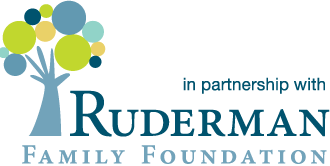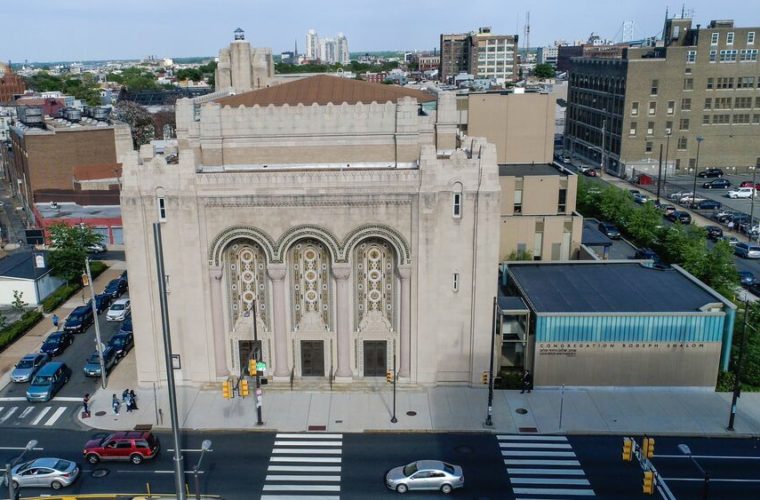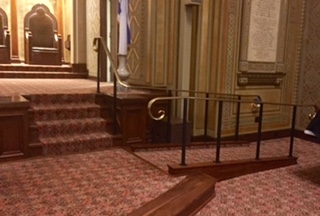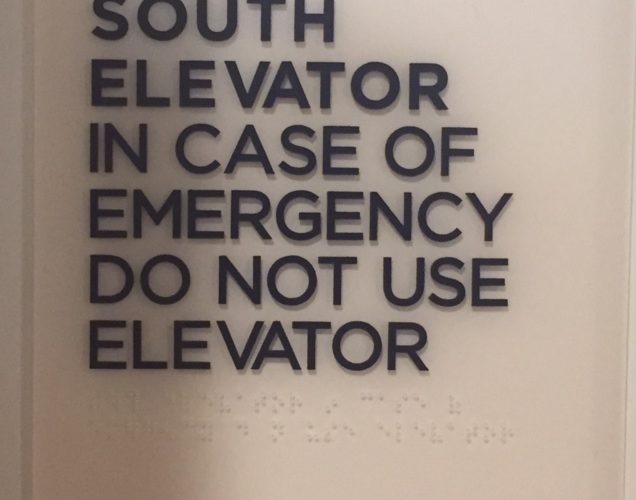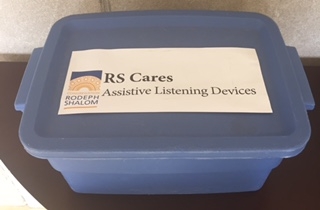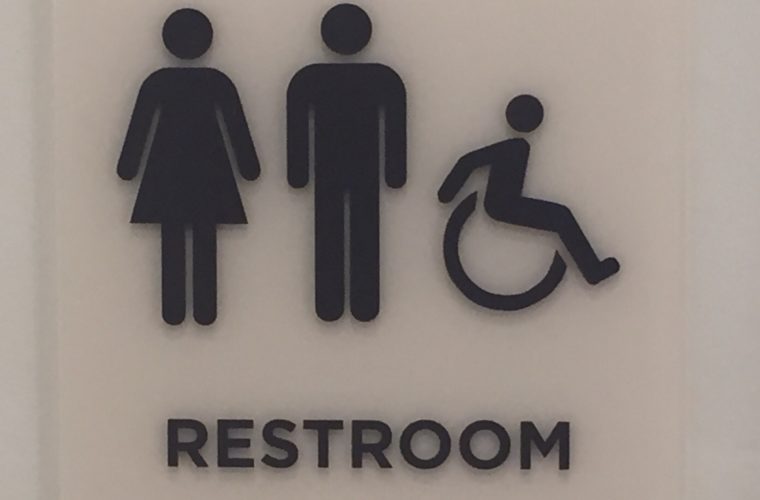Areas of Inclusion: Adults in Communal Life, Advocacy & Community Partnerships, Architectural & Physical Accommodations and Transportation, Autism, Blindness, Deafness, General Inclusion, Mental Health, Parents of Children with Disabilities, Religious School, Technology, Worship, and Youth Group, High School, and College Programming
About the Congregation
615 North Broad Street
Philadelphia, PA 19123
Number of Congregants: 1150
Contact Information
Betsy Fiebach
Inclusion Programming
Does this congregation have an inclusion committee?
Yes
Developing Our Program
We will endeavor here to provide you with a history of how Caring Community expanded at RS. This dates from a meeting of one Rabbi, one Senior Staff and 5 congregants about 8 years ago and grew to a Connection Group today with extensive leadership that approximately 700 members participate in regularly. Its growth was inspired by the vision of Rabbi (now Sr.) Jill Maderer and Catherine Fischer, now Director of Congregational Advancement.
In the beginning, two original Caring Community members created a card outreach to congregants experiencing illness, bereavement, as well as births. This continues today and will include Rabbi’s passage inserts going forward.
Our first major initiative was inspired by a desire to reach any/all congregants unable attend Services and participate in other aspects of congregational life. It was Mitzvah Meals, described above. The effort was first led by Laurel Freedman the spouse of Rabbi Eli. A local Farm Market co-op with whom we worked was our resource for healthy ingredients. A small team met once or twice a month in our large old kitchen to prepare meals for a short list of congregants in need. A few members volunteered to deliver the meals and soon discovered sparks of connection with those receiving them.
Today, Mitzvah Meals has 4 regular “chef” coordinators led by the Caring Community Co-Chair. At least 30 meals, sometimes more are prepared every month. Members volunteer from all corners of the Congregation enjoying the camaraderie and teamwork inspired by performing these mitzvahs and following our sacred commandment of Chesed. It is the heart and soul of our mission of Creating Profound Connections in our congregational family.
Around the same time, a Caring Community leader also created a ‘Munch n Mitzvah” whereby our group met for lunch to prepare Hanukkah and Passover gift bags for homebound Congregants. Two years ago we replaced the Passover gifts and added Shalach Manot at Purim which our PRiSm LGBTQ Connection Group sponsors the evening of the Shpiel.
A notable addition, W (widow) Connection, an affiliate of the national network for bereavement and loss support, was born at RS under the Caring Community umbrella and leadership of a licensed social worker congregant, herself a widow. Depression is often chronic and prevalent in this population. Eight years later WConnection at RS thrives, has received kudos in local press, and serves congregants and non members alike.
Wider in/outreach and inclusion efforts by Caring Community began in earnest following two groundbreaking sermons. The first was Rabbi Jill Maderer’s given Yom Kippur of 5773/2012 candid and forward in its themes entitled, “Unlocking the Gates” [of Connection]. Her message was in part inspired the untimely deaths of several congregants that year from the disease of Addiction; and the great need to bring the disease out of the shadows and “Into the Light”. Rabbi Maderer noted that the 12 Steps of Recovery “sound a lot like Yom Kippur” drawing parallels to them, the UneTaneh Tokef prayer (“I” am not the Higher Power”), and Tshuvah The 12 Gates of Repentance…..also calling to mind The 12 Tribes. Congregants sat forward hushed and listened intently to Rabbi Maderer’s courageous message and call for compassion.
The second message was given by Rabbi Eli Freedman on Erev Rosh Hashanah 5775/2014. He spoke of the 12th Century Rabbi Nachman who suffered and wrote about great personal loss of children and his spouse. This plunged Rabbi Nachman into a dark depression, informed his work, describing caring with “a listening heart”. (Sounds a lot like empathy.) Rabbi Freedman also shared that a depressed spirit in the 12th Century was described by Rambam as Marah Shecorah, a “black bile” thus centuries ago intuitively sensing depression as organic. He referred to stigma in the Jewish Community surrounding mental illness sharing that there is a 40% genetic predisposition to both schizophrenia and the BRCA gene mutation among Ashkenazi Jews. He pointed out the tremendous advocacy in the community for the latter disease; yet continued silence as to the former.
Around this time, Caring Community brought Rabbi Kerry Olitsky, author and Executive Director of Big Tent Judaism to Rodeph Shalom to speak about his book “”100 Blessings Every Day: Daily 12 Step Recovery Affirmations…”. The evening was attended by around 35 congregants, many hesitant. Rabbi Olitsky’s work has been inspired by counseling Jews in recovery seeking comfort and support given that the worlds of AA, NA and Al Anon, though guided by “Higher Power”, were founded by Christians and often meet in churches. He also dispels the myth that Jewish people are immune to addictions. This event broke the ice….and some stigma and silence as well.
Soon after Rabbi Olitsky’s visit, an RS congregant couple with a non-member friend and Board Member of the Caron Treatment Centers founded Caring Community’s Support Group for Parents of Adolescent and Adult Children who suffer the Disease of Addiction and Co-occurring Mental Health Needs (PSG). Four years later the group is deeply knit, going strong and provides anonymous mutual support and advocacy to RS members and non-members alike working to appropriately support their children.
Once the PSG got off the ground, Rabbi Maderer invited the Caring Community Chair to meet with her colleague Rabbi Brian Beal whose rabbinate has focused on compassionate support of Jews in Recovery. This in anticipation of our planned Evening with Patrick J. Kennedy on April 12, 2016. Rabbi Beal offered his insight as to the visioning opportunity presented by this event. Rabbi Maderer then prepared a brief survey to offer attendees at the end of the evening in order to gauge areas of needed support for follow up.
Lead sponsors for our time with Former Congressman Patrick Kennedy were Rodeph Shalom, Caring Community and our Parent Support Group, along with our community partner The Caron Treatment Centers. Many other community partners supported the event, listed below under Work with Consultants and Community Agencies……Prior to his address, Congressman Kennedy joined our sponsors for dinner and was presented a “Recovery Mural” co-created by RS youth, students from Philadelphia’s Bridge Way Recovery High School, and teachers from both.
Approximately 500 people attended (including many congregants). Patrick Kennedy shared his experiences detailed in his book, “A Common Struggle, A Personal Journey Through the Past and Future of Mental Illness and Addiction” It was a powerful, educational, inspiring and deeply personal share. His co-author Stephen Fried, a local author and mental health advocate, facilitated a Q and A at the end as well as a book signing. Rabbi Maderer’s attendee survey indicated needs for food addiction and onsite AA support. Following up, a Caring Community leader plans to start a Food Addicts in Recovery Anonymous regular meeting at RS next March. A plan to establish a regular AA meeting at RS was met with concern for anonymity of congregants so that for now has been tabled.
Last December, in significant follow up to our Evening with PJK, Rodeph Shalom hosted a Mental Health First Aid Training with approximately 50 in attendance many of whom were RS members. This was facilitated by the Philadelphia Department of Behavioral Health and Intellectual Disabilities Services. In January 2018 we will be hosting a Mental Health First Aid Training for adults who regularly engage with youth.
Number of people involved in the effort: 700
Involving People with Disabilities
Please also see above under “How was this program/policy developed?
Funding This Effort
Caring Community receives an annual budget allowance, as well as one as a Connection Group member both overseen by the Board, funds from individual gifts both monetary and in-kind, fundraising for events, and nominal “rent” from support groups. Expenses for assistive devices and additional accommodations are funded in the synagogue budget.
Helpful Agencies & Organizations
Our work with many community organizations in Caring Community (as well as our social action and overall in the congregation) reflects another bedrock mission of RS, that of our commandment of Tikun Olam.
Kieran Timberlake Architects (accommodation renovations); Caron Treatment Centers (PSG and Evening with PJK); WConnection National; Rabbi Kerry Olitsky; Philadelphia DBHDIS (Evening with PJK and MHFA Trainings); Center City Kehillah (Challah for Hospitals); Common Ground Urban Farm Market, Germantown Jewish Center (Caring Community chairperson invited to sit on a panel); new partnership goal with Gaudenzia House (in our RS neighborhood) for treatment and recovery (PSG) Patrick J. Kennedy, Stephen Fried, and A Common Struggle; Friends Hospital, Scattergood Foundation, Bridge Way Recovery High School, Cozen O’Connor; ABA Health Law Section Task Force on Substance Use Disorders and Mental Health, The Jewish Exponent (All for Evening with PJK; Stephen Fried is a continuing resource). These community partners have, and many continue to enhance our work immeasurably.
Spreading Awareness About Our Work
By word of mouth, social media, internet, synagogue publications and web site, blogs, Jewish Exponent, contacts in the active Recovery and mental health treatment and advocacy networks foremost Caron, DBHIDS. Many of our congregants are active as well both professionally and personally in the Jewish and community at large and are great “spreaders of the words”.
Process & Sharing
Marketing Documents Indicating Our Commitment to Inclusion
History, Materials & Processes that Guided Our Approach
We are number one action oriented. Our Caring Community Brain Trust is our best resource in our leaders’ and members’ recollections and history of planning and participation. We would be delighted to share our experience in any way that might benefit URJ and member congregations. And there are numerous more where those came from! Our Engagement and Communications Staffs are the keepers of Caring Community archives. Any particular requests can of course be met. (See previous answer for attachments.)
Evidence of Successful Inclusion Efforts
Anecdotal impressions are too numerous to include all. Here are 3 highlights. One impression of special note: in addition to many congregants, Caring Community leadership, including Rabbi have also been touched by outreach to them in times of need.
Rabbi: Recalls a young congregant who regularly attends Shabbat services who stood during the sharing of Simchas and blessings. He shared that he is in Recovery and just received his “chip” for achieving weeks of sobriety. The congregation then cheered him! Such courage shown and an embrace by RS family.
Senior Staff: Recalls the time a congregant sustained an injury unable to walk and received Mitzvah Meals but confided that she was most concerned about how to walk her dog. Enter her Caring Community Zip Code Cluster! First one congregant/neighbor offered to walk and within 24 hours a spread sheet was created scheduling other member walkers. These Cluster volunteers met their fellow congregant/neighbor’s need 100%. And in the process made new friends.
Caring Community Leader: My significant other and I recently lost his young adult son. He and our family received constant loving support for weeks from many Caring Community members through Mitzvah Meals, visits, cards, Shiva, calls, and gifts in memory of our son.
I would also like to add that my delivery of Mitzvah Meals has evolved into friendly visits and more with 2 elder congregants. One is a woman in her eighties, accomplished in fine arts from whom I have learned so much and see often. The second, a ninety year old member (and his 70 year old caregiver son). Though confined to home and bed my elder friend is clear of mind and shares rich tales of his extraordinary life. The friendship and sharing of both my elder members of my RS family is a gift to me far exceeding what I give them.
Congregant: A congregant member of our PSG, parent of a 26 year-old son who was addicted to many substances for years, though very discouraged kept coming back for the group’s non-judgmental, supportive embrace. Over time, she began to hear the consistent message that the stronger she became in her own recovery from co-dependence, her son might gain strength in his own recovery from addiction. Her husband began attending the group with her. Their son admitted himself to rehab, and now has been sober for 16 months, has a stable job, and is still strong in his recovery.
Testimonials:
Senior Staff: Caring Community best realizes what being a part of a Jewish community means. We consider ourselves a family and RS our home. Feeling safe to be oneself, especially in times of vulnerability, is the essence of fulfilling the mitzvah of our Jewish values and mission. Two examples of how this is carried out via Caring Community: Our extraordinary Mitzvah Meals well described above. Also, inclusion and accessibility removing barriers for those congregants who face physical challenges. This is critical to the dignity and kavod we want each member to feel when entering our building. Many congregants comment on how much better it feels to be at RS with these enhancements. We have increased participation among all members as a result of many recent upgrades and improvements.
Caring Community Leader: Caring Community and Mitzvah Meals has changed my life both in my leadership role and as a congregant on the receiving end of the support and embrace of my RS Family. From my Caring Community work I have found unexpected lasting friendship with elder members unable to leave home, and an inspiring esprit de corps which translates into nourishing meals lovingly prepared from all corners of RS in our Mitzvah Meals kitchen.
Congregant: As a member of Caring Community’s Support Group for Parents of Adolescent and Adult Children suffering the disease of Addiction and Mental Illness (in partnership with Caron), I have a safe place to share with other parents (some are congregants some are not). We are similarly situated to give and receive support surrounding deeply painful challenges of children who face chronic often deadly diseases. This is profound sharing of vulnerable parents whose fragile children also face pervasive stigma. The power of this group support can be truly life-saving. I am profoundly grateful to my RS clergy and Caring Community for making this possible.
Evidence of Changing Attitudes
Please refer to above history and anecdotes .
How We're Using and Sharing the Disabilities Inclusion Learning Center
Please see above response on p.2. We will seek interested and inspired staff and congregants, especially including those differently-abled, who would focus on applying URJ resources to enhance inclusion efforts at RS in traditional aspects. Now that we are better informed, we indeed intend to use URJ supports well.
Future Inclusion Efforts
Many have been referred to above in detail. Primarily, enhancing outreach and inclusion to differently-abled members, expanding our Tuesday evening support group offerings (adding for food addiction, and perhaps caregiver support for congregants who care for chronically or terminally ill family members). We also plan to identify a specialist in Child Bereavement to speak next year (sponsored by a congregant family fund in memory of a young cousin); expand Zip Code Clusters to reach more members; sponsor a mindfulness/meditation experience led by a congregant expert in the field.
Concluding thoughts from Senior Rabbi Maderer:
More and more, our congregation understands this is a place where we can bring our whole selves. We don’t need to check our vulnerability at the door. Whatever it is in us that feels invisible or shameful, whatever it is that that still holds the place of stigma in our society, we need to bring that if we are to fulfill our mission to create profound connections.

